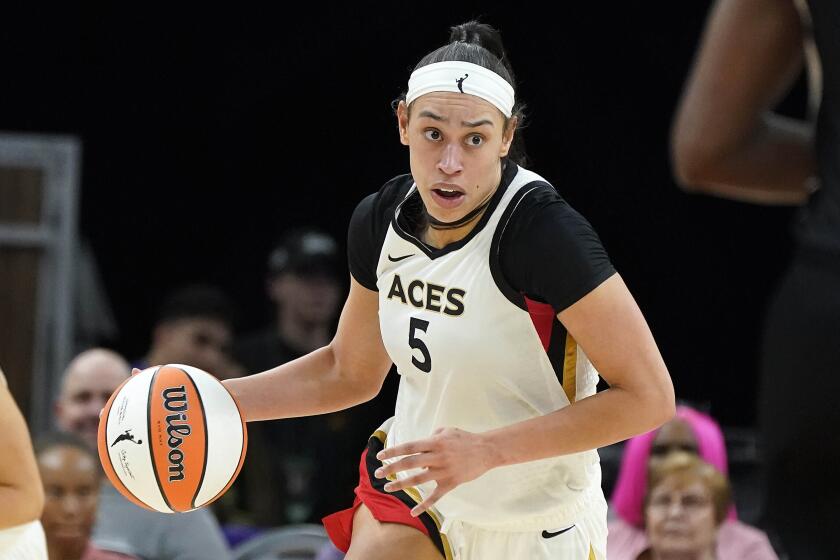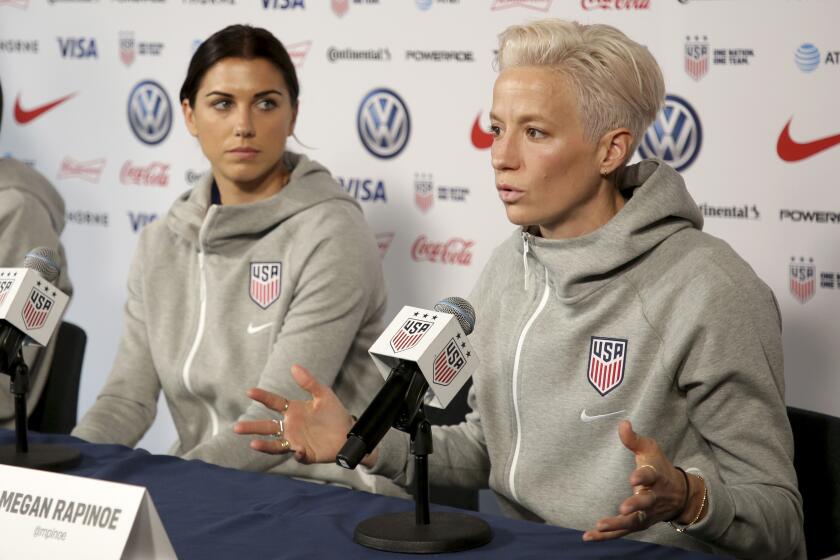Will WNBA players get charter flights in aftermath of Brittney Griner nightmare?
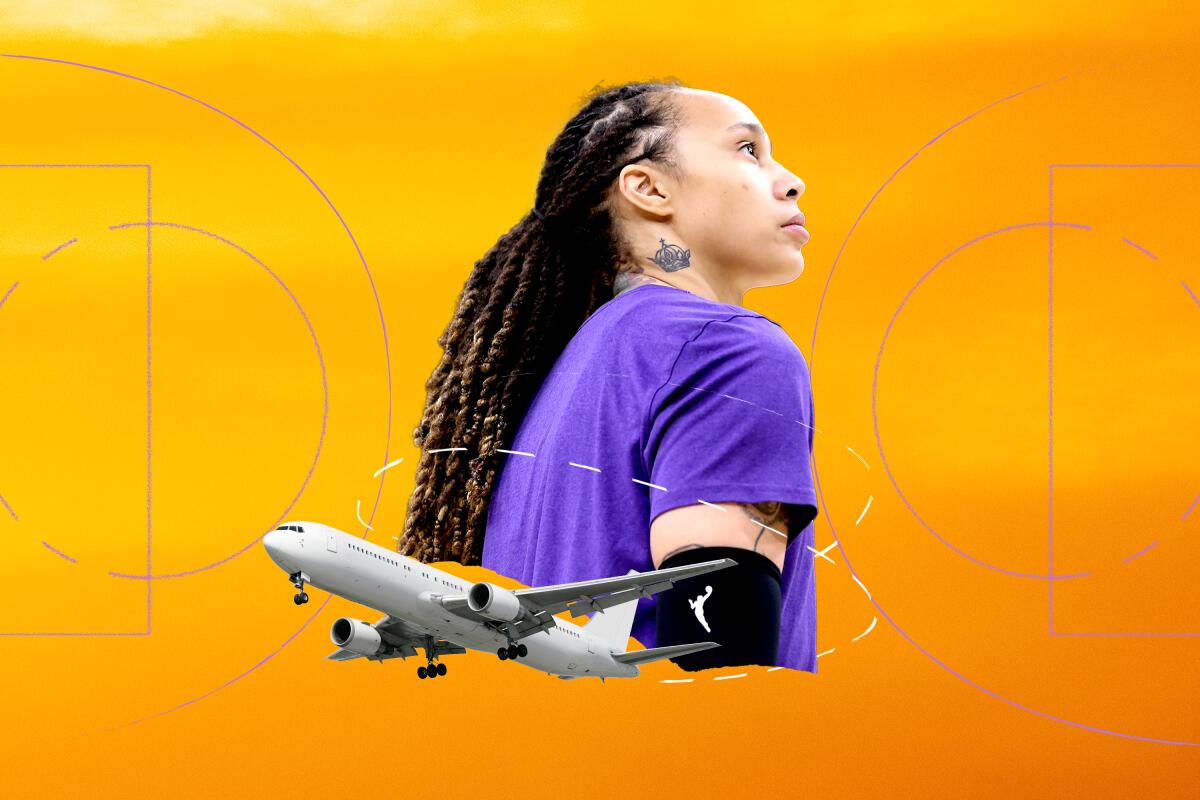
- Share via
Not long after Brittney Griner left a Russian prison, freed in a high-level prisoner swap before Christmas, the women’s basketball star made a surprising announcement.
“I intend to play for the WNBA‘s Phoenix Mercury this season,” she posted on social media.
With league games starting in spring, her return is good news for fans but also raises troublesome questions.
The problem starts with Griner’s potential need to travel on charter planes for security reasons. Though most men’s teams fly private, women’s leagues often scrimp by going commercial, even if it means delays and cramped seats in premium economy. Last summer, half the Sparks team had to sleep in an airport when their flight was canceled.
WNBA stars have responded to Griner’s predicament by offering to contribute to the $25 million or so it would cost for all 12 WNBA teams to make the switch.
The U.S. has offered a deal to Russia aimed at bringing home WNBA star Brittney Griner, Secretary of State Antony J. Blinken said Wednesday. Here’s our coverage.
“Whatever it takes,” All-Star forward Elena Delle Donne said.
Players paying for their own travel won’t solve what sports economists see as an even bigger problem — a discrepancy in the way men’s and women’s sports are treated as businesses in this country.
Experts contend that leagues such as the WNBA, National Women’s Soccer League and Premier Hockey Federation have been hamstrung by a lack of investment in player contracts, coaching salaries, facilities, marketing budgets and television coverage.
“This is really a conversation about unconscious bias,” said Alicia Jessop, who teaches sports law and administration at Pepperdine and runs the RulingSports.com web site. “You’re up against a system and you have to claw down that system.”
The standard argument goes like this: In a free-market economy, women’s sports generate revenue commensurate with their popularity. In other words, women already get exactly what they deserve.
The NBA generates $10 billion annually compared to the WNBA at a reported $60 million. The WNBA won’t reveal financial details but NBA commissioner Adam Silver, whose league is a co-owner, told the Associated Press in 2018 that the women have lost “over $10 million every year we’ve operated.”
Given those numbers, adding charter flights might seem unwise. Experts disagree.
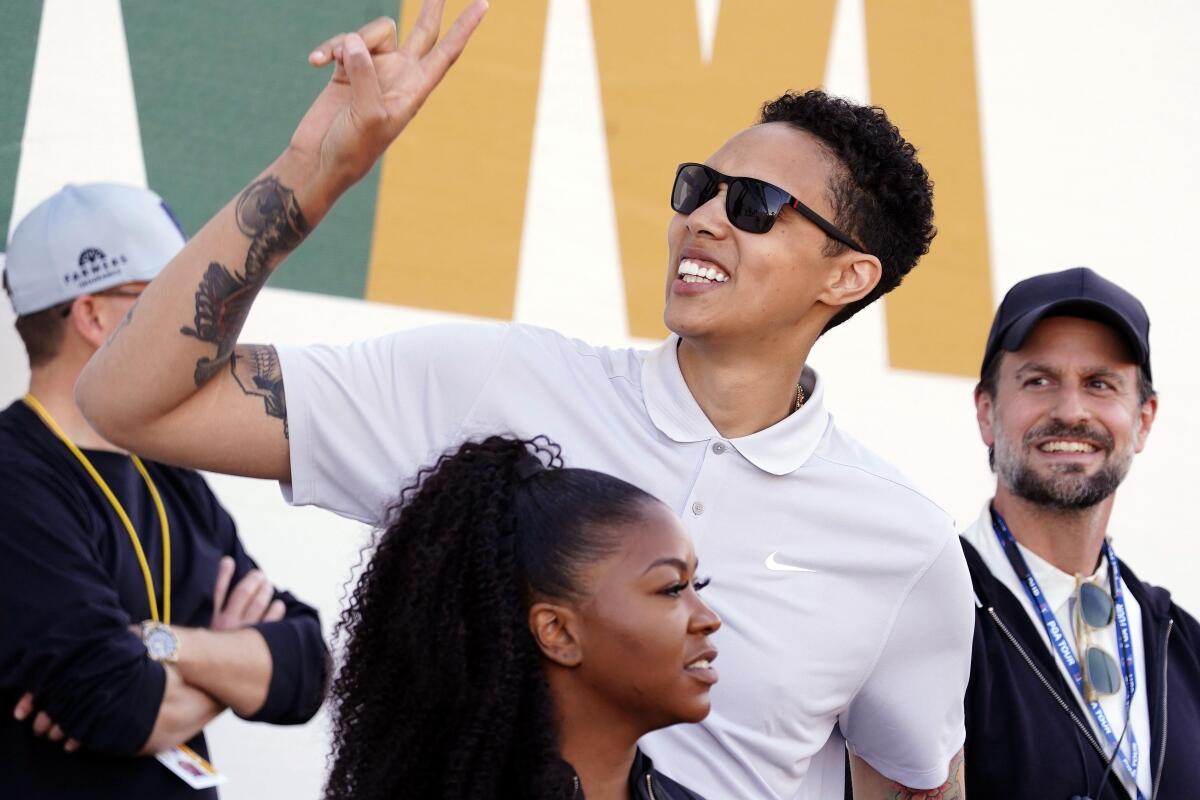
Any business must invest in creating the best-possible product, they say. Better basketball — more three pointers, more diving steals — arguably requires better-paid players and coaches, better training facilities, maybe even more leg room on road trips.
For the WNBA, entering its 27th season, this is no short-term venture.
“The NBA did not make any money in its first 25 years,” said David Berri, an economics professor at Southern Utah University. “Neither did the NFL or Major League Baseball.”
Marketing a league requires patience because people don’t consume sports in the same way they do peanut butter or laundry detergent. Fans must feel passionate enough about their teams to spend on season tickets, watch away games on television and buy the latest merchandise.
“On an average summer day, I can find cornhole or pickleball on TV more easily than I can find the WNBA.”
— Pepperdine sports law professor Alicia Jessop
“The key is developing an emotional attachment,” Berri said. “It comes from parents taking their kids to the stadium. The history of men’s sports says that takes decades.”
History also suggests the U.S. has not yet made that investment in women’s leagues. Cathy Engelbert recalls learning the hard way in 2019 when she left her position as chief executive for the accounting giant Deloitte to become WNBA commissioner.
Fan loyalty was only part of the equation. “What I didn’t know was the huge bias against women’s sports and the under-investment in women’s sports,” she said.
Engelbert had to sell her vision to television networks and corporate advertisers, even some owners.
After buying an NFL team in Pittsburgh in 1933, Art Rooney spent season after season losing money, keeping the franchise alive for nearly 40 years before the Steelers won their first playoff game.
The late Paul Allen, one of the richest men in the world at the time, folded his WNBA franchise, the Portland Fire, in 2002 after three mediocre seasons.
Billionaires do not line up to buy women’s teams the way they do in the NFL or NBA, Berri said, and the reasons are not purely financial. The Lakers, Dodgers and Rams offer examples of ownership throwing money at franchises in pursuit of a championship.
Again, it’s a matter of passion.
Dearica Hamby spoke publicly for the first time since joining the Sparks in a trade after the expectant mother accused members of the Aces of discrimination.
“With men’s sports, the attitude is ‘This is competitive and we’re trying to win and I don’t give a damn if this team makes $3 million or loses $3 million,’” Berri said.
That calculation gets complicated in the WNBA, where management structure is divided between individual owners at 42%, the NBA at 42% and an investor class that recently paid $75 million for a 16% share.
The NBA has been criticized for treating its sister league as a charity or even a spot to park losses, which would not incentivize an aggressive approach to brand building. The same accusation has been leveled at some longtime owners.
Recently, a new generation has bought its way into the WNBA and is pushing for more spending. Las Vegas Aces owner Mark Davis, who also owns the Raiders, hired coach Becky Hammon for a record-setting $1 million and won a championship last season.
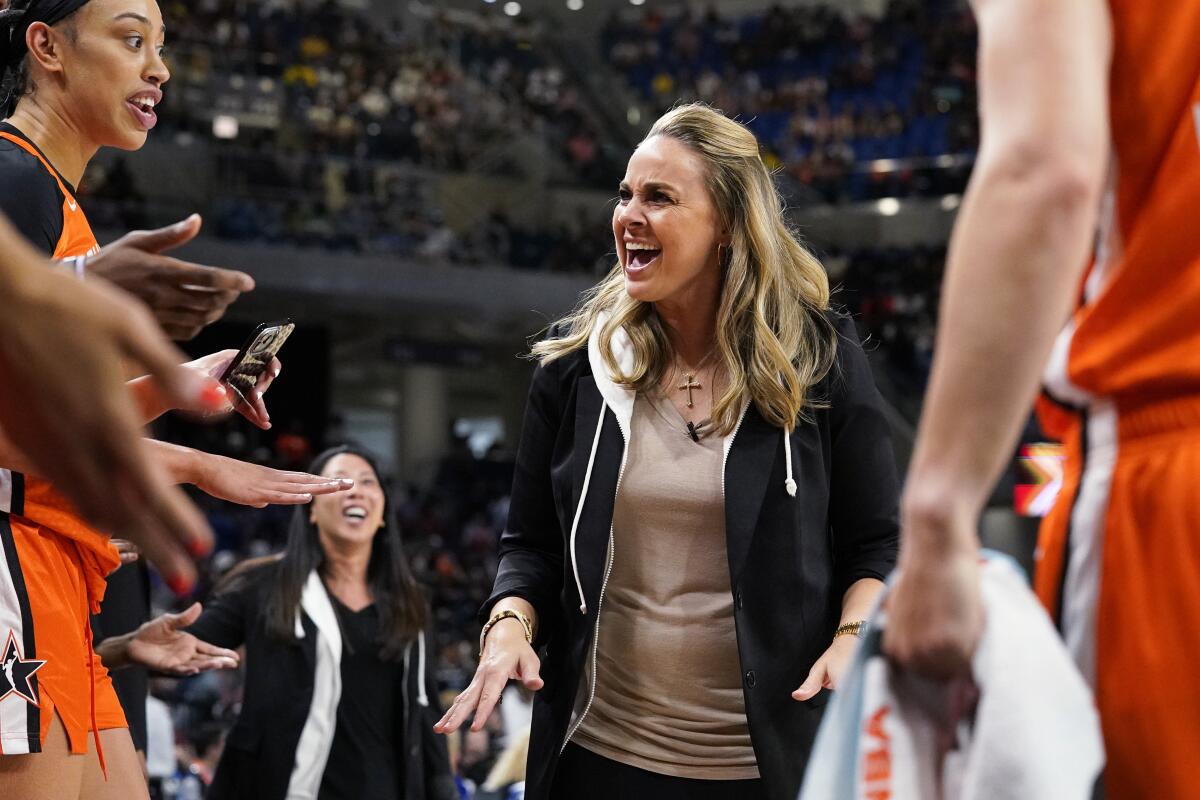
Joe and Clara Wu Tsai acquired the New York Liberty in 2019 and recently signed expensive free agents Breanna Stewart and Courtney Vandersloot. The couple, who also own the NBA’s Brooklyn Nets, was hit with a $500,000 league fine for hiring private planes to take the Liberty to several away games and a brief vacation in Napa during the 2021 season.
“I do think there is more of a recognition among some owners that there can be a lot of growth in this league and in women’s sports in general,” said Jessop, who studies the intersection of business and sport. “But there are still some people leading [the WNBA] with blinders on.”
Asked about discord among owners, Engelbert dismisses the topic as merely “a lot of chatter out there.” The commissioner prefers to focus on what she sees as the biggest obstacle to boosting investment — getting top dollar for broadcast and streaming rights.
There is another recurring debate — of the chicken-and-egg variety — surrounding women’s sports.
A study by USC and Purdue University found that in 2019, television news and highlights devoted only 5% of their time to female athletes. Some observers say women get less coverage because they aren’t as popular; others contend they aren’t as popular because they don’t get enough coverage.
“On an average summer day,” Jessop said, “I can find cornhole or pickleball on TV more easily than I can find the WNBA.”
WNBA viewership has increased significantly in recent seasons, averaging 379,000 viewers a game in 2022. That’s more than Major League Soccer drew, yet the WNBA received $25 million in broadcast rights compared to the MLS at a reported $90 million for a deal that included the U.S. national teams.
“The NBA did not make any money in its first 25 years. Neither did the NFL or major league baseball.”
— Southern Utah economics professor David Berri
This circles back to ownership.
Television rights drive corporate sponsorships and push team valuations into the billions for the NFL, NBA and MLB, so owners in those leagues can afford to pour cash into their franchises. Women’s teams, worth far less, don’t have that luxury.
“Historically, women’s sports are thought of strictly in terms of profits and losses,” Berri said. “You have some owners who treat the WNBA as if they bought a cardboard factory.”
The discrepancy frustrates advocates, who see proof of concept in the popularity of the U.S. women’s soccer team and events such as gymnastics and figure skating at the Olympics. They point out that women comprise more than half the U.S. population and make most household spending decisions.
The settlement was a victory for the USWNT players, whose fans chanted ‘Equal Pay!’ when they won their second straight title in France in 2019.
A 2021 report from Deloitte — Engelbert’s former employer — predicted that women’s sports could surpass an important global benchmark of $1 billion in annual revenue, but only if the industry invests “on a sustained basis in creating more opportunities for women’s sports to prove its commercial worth.”
In Los Angeles, Angel City FC might serve as an example. Though the team struggled in NWSL play last season, its all-star ownership — including actors Natalie Portman and Eva Longoria — helped sell nearly 16,000 season tickets and raise capital at a valuation of more than $100 million before the first game was played.
The team also flew charter during a long road stretch last year.
“So why isn’t there bullish spending [on women’s sports]?” Jessop asked. “If we’re not investing fully … that’s a missed business opportunity.”
As players and some owners continue to push for charter flights in the WNBA, Engelbert remains steadfast about keeping costs down. At least for now.
“We’ve just got to build a long-term economic model to afford it,” she said. “Not just for a few years but for 20 years.”
The commissioner is nothing if not optimistic about the league’s future, touting recent investments from Google and Nike. Though players still make a fraction of what their NBA counterparts are paid, maternity leave and other benefits have improved, as have performance bonuses.
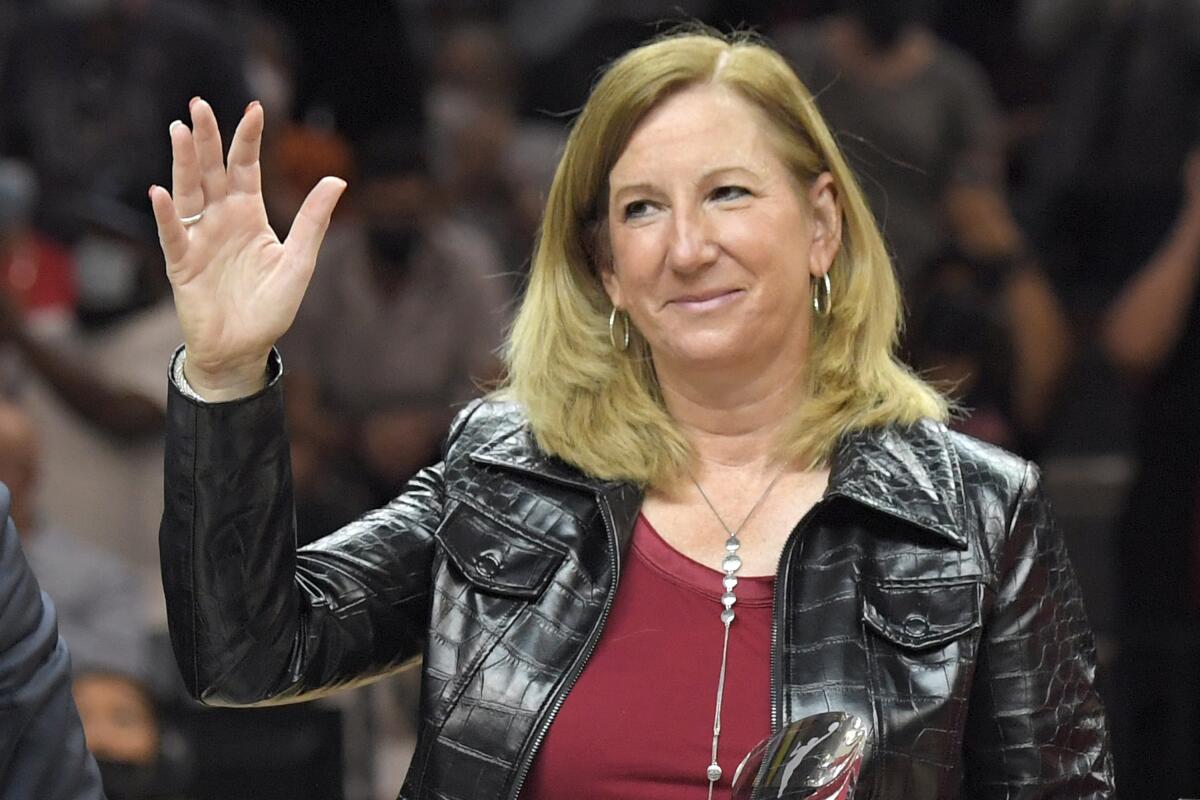
More important, the WNBA’s media rights come up for renewal in 2025, with the league hoping for a significant boost to its annual revenue in that category. It helps having a corporate veteran such as Engelbert at the helm, but Jessop notes the WNBA has its feet “really held to the fire.”
The Griner story won’t go away, putting pressure on the league to change its travel policy sooner rather than later. Jessop felt mixed emotions when players offered to chip in.
“I understand where they are coming from and it demonstrates their love for the game,” the sports law professor said. But, she added, “I think it’s the worst thing they can do. The minute they do that, the league knows it never has to compensate them for their value.”
In the meantime, negative headlines don’t exactly foster growth for a league that is trying to prove it deserves more. More investment. More television coverage. More corporate dollars.
“If you’re constantly telling people that you don’t have money — which is what this charter flight thing does — why should they emotionally invest in you?” said Berri, the economics professor. “You have to convince people you’re the real thing.”
- Share via
Watch L.A. Times Today at 7 p.m. on Spectrum News 1 on Channel 1 or live stream on the Spectrum News App. Palos Verdes Peninsula and Orange County viewers can watch on Cox Systems on channel 99.
More to Read
Go beyond the scoreboard
Get the latest on L.A.'s teams in the daily Sports Report newsletter.
You may occasionally receive promotional content from the Los Angeles Times.


